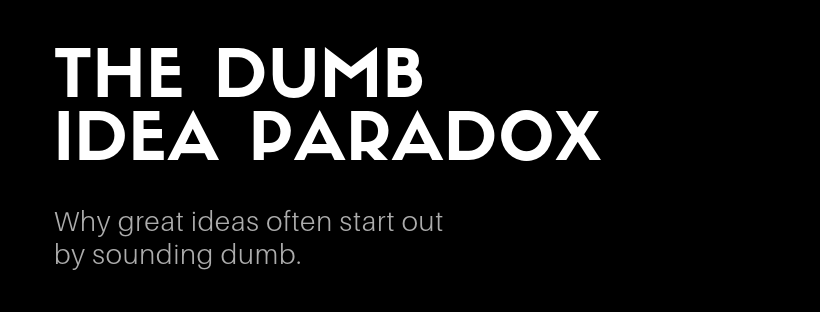
Am I just getting old?
When I encounter a new product idea for the first time, I find myself asking: Is this idea dumb? Or am I just getting old?
Early on, there’s often not much to judge it on besides the idea. Sometimes the idea sounds either dumb or trivial. But over the years, I’ve started to not try to judge too much, especially when it’s early
Ideas seem pretty random because in the past few years, some of the biggest wins were: An app that lets you get into strangers’ cars. An app that lets you stay at random peoples’ houses. Disappearing photos. A site that doesn’t let you play video games, but you can watch other people play. Seriously?
And if you go back a few years earlier, I remember having entire convos about why anyone in the world would want a profile or a website on the internet. Or why phones should be used for calling, and adding email was dumb. It sounds silly, but that was the perspective then
The Dumb Idea Paradox – the official definition
The dumb idea paradox is what happens when an idea sounds dumb, and yet you have a (usually very small) group of people highly engaged in doing it. And maybe that group of people seem to getting bigger and bigger. Will it continue? Will millions ultimately do this thing?
When products that have this property — it’s counterintuitive behavior PLUS it has traction — imho they are the most attractive startups in existence. After all, this is an indicator it’s likely in a new market, and often times, the TAM of these markets ends up being huge!
In other words, this handy graphic:
(Note I made that as a screenshot in GSheets. You’re welcome)
Natives versus immigrants want different kinds of products
Furthermore, these ideas often formed at the seam of the “natives” versus the “immigrants.” If you are Instagram-native, what you consider a great idea for a new retail space or ecomm brand is likely very different than someone who isn’t exposed to the same thousands of pics
The upcoming generation are using tech in a different way. They are Fortnite-native. Minecraft-native. They are streaming-native. They use “insta” differently. Food delivery will be considered a human right. The expectations will be very different.
For network effects-driven products, it matters that your friends are also into the same thing. If my peers aren’t playing Fortnite every day, then I won’t see the same value and engagement. Contrast that to a fully activated network of kids that are on it every day
Thus, I’m sure that the first time I hear about a wild idea that appeals to this group, it will be easy to dismiss out of hand. And perhaps I’d be more attracted in something that takes on the same trends, but is more familiar
Strong and weak technologies
My partner Chris Dixon has written about the idea of strong and weak technologies, which often arrive in pairs at the start of a new technological age. The weak version often sounds more practical, but the strong ones often win. Here are some examples:
The weak version of a technology is often the more plausible, “immigrant” version of an idea. The stronger version will sound better to folks who are natives.
As an investor in consumer companies, I’m always startled when I see surprisingly strong growth metrics on top of an idea that I don’t get. It’s always a signal that I need to dig deeper, at least until I feel like I’m starting to get it. But it’s hard.
So I repeat the question: The next time you hear an idea that sounds dumb, ask yourself — is it really dumb? Or are you just getting old?